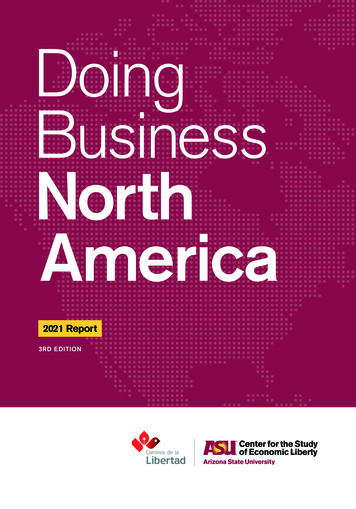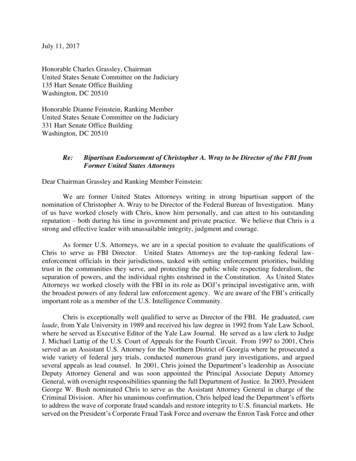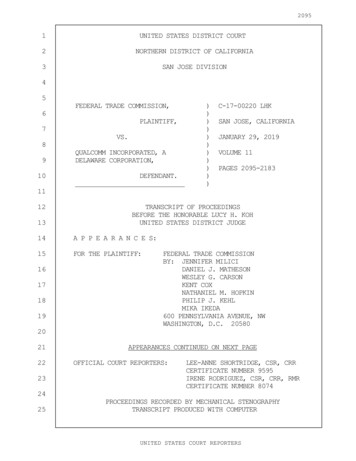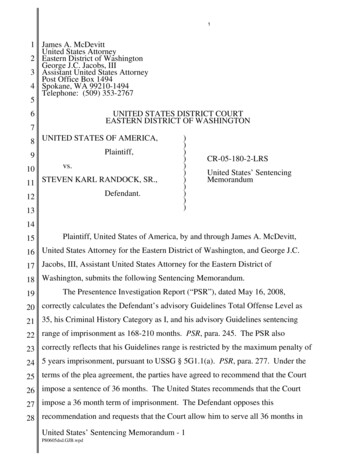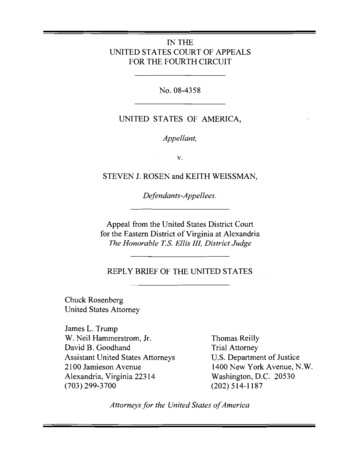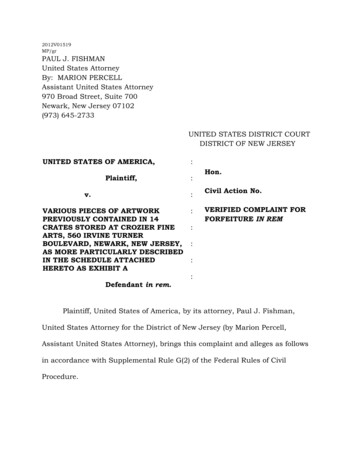
Transcription
IN THE UNITED STATES DISTRICT COURT FOR THEWESTERN DISTRICT OF NORTH CAROLINAUNITED STATES OF AMERICAPlaintiff,v.ANDREW DEDOMINICIS, D/B/AIMPACT MINISTRIES INTERNATIONALDefendant.))))))))))Civil No.COMPLAINT FOR PERMANENT INJUNCTIONAND OTHER RELIEFThe United States of America, plaintiff, for its Complaint states as follows.Nature of Action1.The United States brings this complaint to enjoin Andrew DeDominicis, formerlyknown as Andrew D. Brown, individually and doing business as Impact Ministries Internationalor through any other entity, and any other persons in active concert or participation with him,from directly or indirectly:(a)Organizing, promoting, marketing, or selling any tax shelter, plan or arrangement,including the “corporation sole” scheme, that advises or assists individuals toattempt to violate the internal revenue laws or unlawfully evade the assessment orcollection of their federal tax liabilities;(b)Making false or fraudulent statements about the allowability of any deduction orcredit, the excludability of any income, or the securing of any tax benefit by thereason of participating in any plans or arrangements;(c)Instructing, advising, aiding and abetting, or assisting others to violate the taxlaws, including to evade the payment of taxes;(d)Engaging in conduct subject to penalty under 26 U.S.C. § 6700, i.e., by making orfurnishing, in connection with the organization or sale of a shelter, plan, orarrangement, a statement DeDominicis knows or has reason to know to be false orfraudulent as to any material matter under the federal tax laws;Case 1:11-cv-00006 Document 1Filed 01/14/11 Page 1 of 22
(e)Engaging in any conduct that interferes with the administration and enforcementof the internal revenue laws; and(f)Engaging in any activity subject to penalty under the Internal Revenue Code.2.An injunction is warranted based on DeDominicis’s continuing conduct as apromoter of a corporation sole tax-fraud scheme. If not enjoined, DeDominicis’s continuingactions will result in the IRS having to devote scarce resources to locating and investigatingindividuals, who, by participating in DeDominicis’s scheme, have improperly stopped filingaccurate federal income tax returns and paying their federal income taxes. DeDominicis’sactions, if not stopped, may also result in penalties and other civil and criminal sanctions beingimposed on those individuals.Jurisdiction and Venue3.Jurisdiction is conferred on this Court by 28 U.S.C. §§ 1340 and 1345, and §§7402(a) and 7408 of the Internal Revenue Code of 1986 (26 U.S.C.) (“Code”).4.Venue is proper in this Court pursuant to 28 U.S.C. § 1391.Authorization5.This action has been requested by a delegate of the Secretary of Treasury andcommenced at the direction of a delegate of the Attorney General of the United States, pursuantto Code §§ 7402 and 7408.Defendant6.Defendant, Andrew D. DeDominicis, formerly known as Andrew D. Brown, livesin Dallas, North Carolina, and operates Impact Ministries International (hereinafter referred to as“IMI”), in Shelby, North Carolina. IMI is organized under Nevada law as a corporation sole.-2-Case 1:11-cv-00006 Document 1Filed 01/14/11 Page 2 of 22
7.DeDominicis has an insurance adjuster’s license in North Carolina, SouthCarolina and Texas. In 2004 and 2005, he worked as a subcontractor for State Farm Insurance.In the past, DeDominicis has also reported income on his Schedule C for construction labor.Defendant’s Activities8.DeDominicis promotes and sells an arrangement known as the “corporation sole.”9.Corporations sole are authorized under the laws of some states to enable religiousleaders to hold property and conduct business for the benefit of the religious entity (as opposed tothe benefit of the office holder, or entity creator, himself). Rev. Rul. 2004-27, 2004-1 C.B. 625,626. Title to property that vests in the office holder as a corporation sole passes to the successorsto the office by operation of law (not to the office holder’s heirs as DeDominicis suggests).10.The purpose of a corporation sole is to ensure continuity of property ownershipfor assets dedicated to the benefit of a legitimate religious organization.11.The corporation sole has been identified in the IRS’s annual consumer alert oftax scams to avoid. (See http://www.irs.gov/newsroom/article/0,,id 136337,00.html.)1.12.In April 2002, DeDominicis formed IMI as a corporation sole with the NevadaSecretary of State. DeDominicis is listed as the sole officer and the official title of thecorporation sole is the “Office of the Presiding Chaplin of Impact Ministries International.” IMI1The IRS alert describes the scheme as follows: “Participants apply for incorporationunder the pretext of being a ‘bishop’ or ‘overseer’ of a one-person, phony religious organizationor society with the idea that this entitles the individual to exemption from federal income taxes asa nonprofit, religious organization. When used as intended, Corporation Sole statutes enablereligious leaders to separate themselves legally from the control and ownership of church assets.But the rules have been twisted at seminars where taxpayers are charged fees of 1,000 or moreand incorrectly told that Corporation Sole laws provide a ‘legal’ way to escape paying federalincome taxes, child support and other personal debts.”-3-Case 1:11-cv-00006 Document 1Filed 01/14/11 Page 3 of 22
generates revenue by selling corporation sole packages. To evade paying income tax,DeDominicis conveniently classifies the money IMI receives for providing corporation solepackages, advice, and services as a “donation.” No federal tax returns have ever been filed byIMI. Despite DeDominicis’s claim that he is a minister, IMI clearly operates as a for-profitenterprise in the business of selling corporations sole, and not as a legitimate church or ministry.13.DeDominicis actively promotes the sale and use of the corporation solenationwide via his website, www.impactministries-int.net or www.impactministries-int.org, andby word of mouth.14.Because of his website, DeDominicis is able to broadcast his scheme to a wideaudience. Since 2002, and as of September 22, 2010, the IRS has identified 163 persons across34 states who have formed a corporation sole with the assistance of DeDominicis.15.DeDominicis’s IMI website provides a wealth of bogus information regarding thepurported benefits of forming a corporation sole. The website has a section entitled “WhyShould I have a Corporation Sole?” in which DeDominicis states, “I would like to address thereason why I think every individual, every family and every church should be utilizing this typeof organizational structure.”16.Corporations sole are not intended to be used by individuals or families with nounderlying affiliation to a legitimate religious organization. The corporation sole exists for theprotection of church assets. DeDominicis half-heartedly attempts a disclaimer by cautioning thatthe corporation sole should never be used solely for tax evasion purposes, but even this statementshows that the corporation sole can be used, at least in part, to evade taxes.-4-Case 1:11-cv-00006 Document 1Filed 01/14/11 Page 4 of 22
17.Despite the purported disclaimer, DeDominicis asserts that the corporation solecan be used by virtually anyone as a means of safeguarding assets; thus, tax evasion is exactlywhat DeDominicis advocates. According to DeDominicis’s website, the corporation sole“provides for the Christian the means of creating, receiving and generating wealth all in a tax freeenvironment enabling the presiding Christian officer or his successors to freely spend this wealthas he sees is beneficial to his office.”18.DeDominicis urges website visitors to complete the online registration form inorder to begin the process of creating their own corporation sole. After customers complete theregistration form, DeDominicis sends them a 22-page report (Report) via email. The websitealso contains a link where visitors may request a copy of the Report via email.19.DeDominicis sells the corporation sole package (typically charging around 2,500), although he claims to provide his services and assistance on a “donation” basis. Onecustomer, who purchased a corporation sole from DeDominicis in 2009, said that even thoughthe fee he was charged was classified as a “suggested donation,” he understood that in order tohave DeDominicis form the corporation sole, he would have to pay IMI the money.20.The corporation sole package includes advice, forms, the Report, the OperationalMinistry Guide, and the filing of paperwork. Interested customers are directed to contactDeDominicis (“the ministry office”) for details and to set up a private consultation.21.DeDominicis registers the corporations sole for customers in Nevada, which isgenerally deemed to be friendly for such ventures. According to DeDominicis, he uses Nevada“because there are so many religious Corporation Soles [sic] in Nevada it is very unlikely that-5-Case 1:11-cv-00006 Document 1Filed 01/14/11 Page 5 of 22
any negative changes will be made in this state.” IMI serves as the registered agent in Nevada foreach corporation sole created by DeDominicis.22.After registering the corporation sole, DeDominicis mails participants “TheCorporation Sole Package” which includes the Articles of Incorporation, a corporate seal(complete with ministry name and custom logo), a certificate of good standing from the NevadaSecretary of State’s office, a copy of the SS #4 form filed on behalf of the presiding officer byDeDominicis with the IRS, the employer identification number (EIN) for the corporation sole(needed to open a bank account for the corporation sole), and a letter of appointment for thenamed successor of the corporation sole.23.DeDominicis also provides participants with a copy of his “Operational MinistryGuide & Commonly Asked Questions” (Guide). DeDominicis urges participants to keep theGuide “private,” suggesting he knows his advice and scheme are bogus. The Guide providesmuch more insight into DeDominicis’s corporation sole tax scheme than his public website. TheGuide states: That the corporation sole can accept tax deductible charitable donations andqualifies as a 50% organization. [I.R.C. 170(1)(A)(i) states that “any charitablecontribution to a church or a convention or association of churches.shall beallowed to the extent that the aggregate of such contributions does not exceed 50percent of the taxpayer’s contribution base for the taxable year”]. The Guideinstructs participants to provide contributors with a formal letter of acceptance sothat they may claim a tax deduction. Instructions on how to convey assets, both personal and real property, as well asinvestment property to the corporation sole. The Guide says the corporation solecan then cover the expenses related to these possessions; That an officer of the corporation sole can buy, sell, trade, or donate any property,real or personal, belonging to the corporation;-6-Case 1:11-cv-00006 Document 1Filed 01/14/11 Page 6 of 22
That participants may establish credit for the corporation sole by paying mortgageor car payments from its bank account; That the payment of remuneration for services can be provided in the form of an“honorarium or gift” [This is presumed to imply that a business conducting itselfthrough the corporation sole can receive non-taxable income for services itprovides so long as the payments are deemed “honorariums” or “gifts”]; Instructions on how to terminate the designation of an already approved 501(c)(3)organization and continue it as a corporation sole; That assets in a corporation sole cannot be attached for anything the presidingofficer does as an individual and vice versa; That taking a vow of poverty is an important decision in the operation of thecorporation sole; and That once the certificates of incorporation are received the corporation sole canopen a bank account. The Guide instructs participants NOT to provide the bankwith the Articles of Incorporation unless specifically requested. The Guide alsoinstructs participants to use specific terminology when setting up the corporationsole bank account and urges participants to tell the bank “I need to open a noninterest bearing, business checking account for a non profit corporation.”DeDominicis instructs customers to, “Say it exactly like this and you won’t haveany problems.”24.Throughout the IMI website, the 22-page Report, and the Guide, DeDominicispurports to be very knowledgeable about corporations sole, and more specifically, about the taxexempt benefits which he claims flow from electing corporation sole status. His promotionalmaterials contain extensive discussions about provisions of the tax code and the tax benefitsassociated with a corporation sole. DeDominicis also discourages customers from consulting anattorney or a tax professional, telling customers that “they” (the professionals) are not likely tounderstand the corporation sole. DeDominicis undoubtedly knows that a licensed professionalwould quickly recognize his corporation sole scheme as a scam.-7-Case 1:11-cv-00006 Document 1Filed 01/14/11 Page 7 of 22
25.In reality, DeDominicis promotes the corporation sole not as a legitimate structureto ensure continuing ownership of property for the benefit of a legitimate religious organization,but as a means to evade the reporting and payment of federal income taxes, as well as a way toconceal assets, and thereby evade estate and inheritance taxes and IRS collection efforts.26.DeDominicis tells participants that upon forming a corporation sole, “There is noone to tell you how to conduct your affairs. No board, No taxing authorities, not even [the] IRS.”27.DeDominicis contends that when correctly created, a corporation sole is notmerely tax-exempt under § 501(c)(3), but is instead “immune” from taxation under IRC §508(c)(1)(A). While it is true that churches are exempt from filing requirements under the508(c)(1)(A) exception,2 simply forming a corporation sole does not automatically transform theunderlying entity into a church, thereby making it tax-exempt.28.DeDominicis falsely informs participants that a corporation sole will be treated asa “church” with no tax-return filing requirement. The corporation sole must still qualify as achurch before claiming the exception under § 508(c)(1)(A) and the accompanying tax benefitsunder § 501(c)(3).3 The conferral of that benefit is not automatic by simply incorporating as a2In order to be considered for “tax-exempt” status under I.R.C. § 501(c)(3), I.R.C.§ 508(a) requires an organization to notify the IRS that they are applying for this recognition.This is done by filing IRS Form 1023. I.R.C. § 508(c)(1)(A) does provide a mandatory exceptionto the notification requirement for churches. These organizations are exempt from filingrequirements if they meet the definition of a religious organization.3Although there is no requirement to do so, many churches seek formal recognitionof tax-exempt status to assure the church leaders, members and contributors that the church isrecognized as exempt and qualifies for the tax related benefits. Absent this recognition, theburden is on the taxpayer who contributes to a church to show that the entity qualifies as a §501(c)(3) organization. DeDominicis falsely tells participants that their corporation sole mayreceive charitable contributions that are automatically tax deductible for donors. This is not trueunless the taxpayer can prove that the organization has a bona fide religious or charitable-8-Case 1:11-cv-00006 Document 1Filed 01/14/11 Page 8 of 22
corporation sole, as DeDominicis falsely suggests in his Guide. Few, if any, of the corporationssole formed by DeDominicis constitute a church under IRS standards.29.A key component to DeDominicis’s corporation sole tax scheme is his fraudulentdefinition of what constitutes a “church.” He claims that a “church” is whatever type of religiousestablishment one deems it to be and that it can be used for all kinds of ministerial, educationaland charitable activities, or any ecclesiastical purpose. On his website, DeDominicis states thata church is “simply a religious establishment consisting of two or more individuals which may ormay not have buildings, ceremonies, a creed, robes, and/or vestments.” Under DeDominicis’sself-serving definition, virtually any person, business, or entity, could form a corporation sole andqualify as a tax-exempt “church,” so long as the principal officer claims the “organization”serves some ecclesiastical purpose, or just simply believes in God.30.Building on that theme, DeDominicis blends half-truths with false statements onhis website and in the Guide. Both contain numerous false or misleading statements regardingthe corporation sole and concomitant tax benefits, including the following: They are automatically treated as churches and are thus looked upon by the IRS as“qualified organizations.” IRC Section 508(c)(1)(A) provides tax “immunity” to corporations sole and canbe freely elected, thus avoiding federal tax filings and record-keepingrequirements. Entities that elect tax “immunity” under IRC Section 508(c)(1) are not required toqualify as religious organizations under IRC Section 501(c)(3). Contributions to a corporation sole are tax deductible to donors. Problems of probate court and inheritance taxes are solved by establishing acorporation sole, allowing wealth to stay within the family.purpose.-9-Case 1:11-cv-00006 Document 1Filed 01/14/11 Page 9 of 22
Taking a vow of poverty allows for the provision of personal assets likeautomobiles and television sets to corporation sole members.31.At the crux of this bogus scheme, DeDominicis emphasizes that like himselfparticipants will still be able to control and use whatever assets they transfer to the corporationsole for their own personal benefit, including the payment of personal expenses. In the Report,DeDominicis says, the “Corporation Sole can be responsible to provide for all your needs (i.e.shelter, food, transportation, clothing, medical, etc.). This occurs first by conveying all that youown and all future earnings to [the] Corporation Sole. You make a record vow of poverty. Thislets the world know that you are now a pauper and own nothing.”32.DeDominicis tells prospective customers that “when one is under a vow ofpoverty, the physical objects in their possession are not their own, although it may be their job tolook after and use those objects. Taking a vow of Poverty to the Corporation Sole means owningnothing, but controlling all, as a steward of God’s property.”33.DeDominicis urges participants to convey their assets to the corporation sole andto take a vow of poverty, which he says allows them to shield their assets and income fromcreditors like the IRS. He says, “Giving up your right to own something and conveying thatownership directly to a corporation sole can save you and your successive loved ones literallytens of thousands of dollars [presumably in tax savings] over the course of 2-3 generations.”34.DeDominicis assures customers that, despite taking a vow of poverty, they maystill retain control and enjoyment of assets and other property distributed to the corporation sole,as he does.- 10 -Case 1:11-cv-00006 Document 1Filed 01/14/11 Page 10 of 22
35.Following the corporation sole tax scheme playbook, DeDominicis falsely tellscustomers that if they form a corporation sole, and become the “presiding officer,” they caneffectively order themselves to “undertake duties in one’s field of training or experience” and theincome they receive (i.e. wages/salary) is not taxable.36.In his Report, DeDominicis contends that under I.R.C. § 3401 (A)(9) “the term‘wages’ for tax withholding purposes does not include remuneration paid for services performedby a duly ordained, commissioned or licensed minister of a church in the exercise of his ministryor by a member of a religious order in the exercise of duties required by such order.”37.DeDominicis then adds, “The nature or extent of such services is IMMATERIALso long as it is a service that the minister is directed or required to perform by ecclesiasticalsuperiors.” According to DeDominicis, so long as the head of the “ministry” directs or requiresthemselves or someone else to do something, regardless of the “nature” of that activity,“donations” or “gifts” received for performing that activity are not taxable. Quoting from theGuide, DeDominicis falsely claims that, “If the religious order of which one is a member directsone to undertake duties in one's field of training or experience, as a self-employed person, thenany income received is not taxable as income from a ‘trade or business.’” Under this theory, if acorporation sole overseer owns a “divinely-inspired” or “Christian-based” landscaping business,and he undertakes mowing his neighbor’s lawn as a part of carrying out his “ministry,” theoverseer can accept money for his services as a “donation” or “gift” to the corporation sole, andby doing so, avoid paying reporting that money as income. Meanwhile, the overseer can evadepaying federal income tax and use the corporation sole funds to pay personal expenses.- 11 -Case 1:11-cv-00006 Document 1Filed 01/14/11 Page 11 of 22
38.DeDominicis will likely contend that every corporation sole he forms has areligious or charitable purpose, or at least claim that was his understanding when he formed theentity. DeDominicis will also rely on his disclaimers which say that individuals who do not havea charitable or religious purpose should not form a corporation sole. Yet, DeDominicis’scontradictory statements in his promotional materials, the 22-Page Report and the OperationalMinistry Guide, show the true intent behind his scheme, which is to help customers evade taxesthrough use of the corporation sole.39.DeDominicis first says that IMI “does not condone or recommend that you useyour corporation sole to be engaged in any type of business that operates outside of the scope ofyour ministerial, educational, and charitable purposes.” Yet in the very next paragraph,DeDominicis provides an example of how an individual could operate a business through acorporation sole. DeDominicis says the “CS” (corporation sole) could buy a business and “couldcontinue (operating) with a slightly different name. For Example: Rapha Care Center, LLC issold to Rapha Care Ministry.” DeDominicis tells customers to “avoid standard commerce termsfor the CS such as services, company, corporation, etc.” He says, “The CS can run a business toprovide a means to follow its mission. It can be a grocery, contractor, carpenter, departmentstore, school, medical office just about anything you can think of that is legal and lawful.”40.Despite DeDominicis’s disclaimers, in essence he is promoting the shop worncorporation sole scheme. Following his plan, you call yourself a church if you believe in God,you form a corporation sole (through him of course for a “donation” he doesn’t pay taxes on),you tell yourself to continue working in your field of experience, and you convey your personal- 12 -Case 1:11-cv-00006 Document 1Filed 01/14/11 Page 12 of 22
and/or business assets to the corporation sole. You then take a vow of poverty and pay yourpersonal expenses with funds of the corporation sole. Through it all, you become tax-exempt.41.In furthering this scheme, DeDominicis uses his influence as a so-called ministerto exploit customers and convince others that the corporation sole is a legitimate way for abusiness or an individual to incorporate, and in doing so, avoid paying income taxes.42.For instance, DeDominicis encouraged Patricia King, a nurse in Tennessee, togive him 2,500 to form a corporation sole for her nursing practice. DeDominicis assured Ms.King that the corporation sole was an appropriate way to run her nursing practice.43.DeDominicis likewise convinced James Kurzweg to form a corporation sole forhis music business. Mr. Kurzweg was a musician looking to go into the business of making andselling worship music CDs. DeDominicis urged him to form a corporation sole so that he couldaccept money from people as “gifts” and so that purchasers could claim a charitable contributiondeduction for their CD purchases. Mr. Kurzweg told the IRS that he did not file a tax return forthe CD business because DeDominicis advised him that a corporation sole was exempt fromfederal taxes.44.Jorge Parrott paid DeDominicis 2,500 to set up a corporation sole. DeDominicistold Parrott that the corporation sole had been around for 400 years, which is true, but it does notappear that DeDominicis told Parrott that the corporation sole was an entity traditionally used bythe Catholic church and other legitimate religious organizations to hold church assets, notpersonal assets. DeDominicis also falsely told Parrott that individuals could make tax-deductiblecharitable contributions to the corporation sole and that Parrott would no longer need to file taxreturns for the corporation sole or himself.- 13 -Case 1:11-cv-00006 Document 1Filed 01/14/11 Page 13 of 22
45.James Rollans paid DeDominicis 2,450 to set up a corporation sole calledRaising Hope Ministries. DeDominicis falsely told Rollans that Rollans could claim a deductionon his personal income tax return for contributions Rollans made to his corporation sole. Anaudit revealed that Rollans contributed 50,000 to his corporation sole and deducted it on his2006 personal tax return.46.DeDominicis’s marketing and organizing of the corporation sole has causedfurther harm to the government because many customers are using corporations sole promoted byDeDominicis to evade taxation. Those customers have used the corporation sole as a shell tooperate for-profit businesses and to hide assets.47.For example, Russell Obrey, who paid DeDominicis 2,450 to set up hiscorporation sole called Crown Pacific International Ministries, said he purchased the corporationsole mainly for asset protection because the IRS had been coming after him for his involvementwith a trust scheme during the 1990s. DeDominicis knew or should have known that Obrey’scorporation sole would not serve a religious purpose. Obrey operated a painting businessthrough his corporation sole. DeDominicis told Obrey that “everything done in the name of acorp. sole was NOT reportable and therefore NOT taxable.” Obrey also transferred twoproperties in Merced, California, to the corporation sole. Obrey said that by transferring theproperty to the corporation sole, he and his wife were able to shield the assets from the IRS andthe Franchise Tax Board (California tax collection agency). Obrey also told IRS investigatorsthat DeDominicis falsely told him that he could take a charitable deduction for contributionsObrey made to his corporation sole.- 14 -Case 1:11-cv-00006 Document 1Filed 01/14/11 Page 14 of 22
48.David Hovey paid DeDominicis 2,400 to set up his corporation sole called theTemple of Illumination a Sanctuary for Christ Ministry (Temple). Hovey claims he is a minister,but when he formed the corporation sole DeDominicis knew or should have known that Hoveywas not currently practicing as a minister nor did his “church” have any members. Nevertheless,DeDominicis proceeded with creating the corporation sole, and DeDominicis falsely told Hoveythat the corporation sole was tax-exempt and that Hovey was not required to file tax returns.49.Hovey transferred significant assets to his corporation sole. Hovey owned a pieceof property in Santa Barbara, California, which he inherited in July of 1997. Hovey transferredthe Santa Barbara property to Temple on June 23, 2006. Four days later he sold the property for 650,000 and deposited the proceeds into Temple’s bank account. He failed to report or payincome tax on a capital gain of over 180,000. Hovey has also used funds from his corporationsole bank account to pay expenses related to a personal lawsuit, his personal residence, and theKapaka Road property. Hovey also deducted a cash contribution of 12,500 he made to Templeon his 2006 personal return.50.DeDominicis’s scheme has naturally attracted tax defiers who have been non-filers for many years. DeDominicis’s scheme clearly appeals to individuals looking for a way toevade paying income taxes.51.For instance, Gregg Wolfe, a non-filer since at least 2003, formed a corporationsole called Nakami Chi Group Ministries International (NCGMI) through DeDominicis in 2002.Through NCGMI, Wolfe marketed and sold unregistered securities in the form of investmentcontracts and company stock to investors in Arizona and 12 other states. Wolfe promisedinvestors annual returns of 24 percent. Just as DeDominicis advises in his promotional literature,- 15 -Case 1:11-cv-00006 Document 1Filed 01/14/11 Page 15 of 22
Wolfe suggested that investors refer to their investments as “donations” to his corporation soleand even advised them to form their own corporations sole, falsely informing them that thiswould reduce their income tax liability on their investment returns.452.Douglas Littell paid DeDominicis 2,450 to set up a corporation sole calledAbraham’s Tent Ministry in 2003. Littell worked primarily as an independent contractor, sellingdoors and windows for The Construction Store (TCS), a company located in Florida. Afterforming his corporation sole, Littell told the President of TCS to begin issuing payments for hisservices to Abraham’s Tent Ministry. Checks totaling in excess of 575,000 were paid by TCSto Littell’s corporation sole, Abraham’s Tent Ministry, between 2004 and 2006. In February of2010, when asked by an IRS examiner why he had not filed tax returns, Littell stated that he didnot have to file and abruptly terminated the call. It appears that Littell is operating his door andwindow subcontracting sales business through his corporation sole, failing for many years toreport considerable taxabl
12. In April 2002, DeDominicis formed IMI as a corporation sole with the Nevada Secretary of State. DeDominicis is listed as the sole officer and the official title of the corporation sole is the "Office of the Presiding Chaplin of Impact Ministries International." IMI Case 1:11-cv-00006 Document 1 Filed 01/14/11 Page 3 of 22




